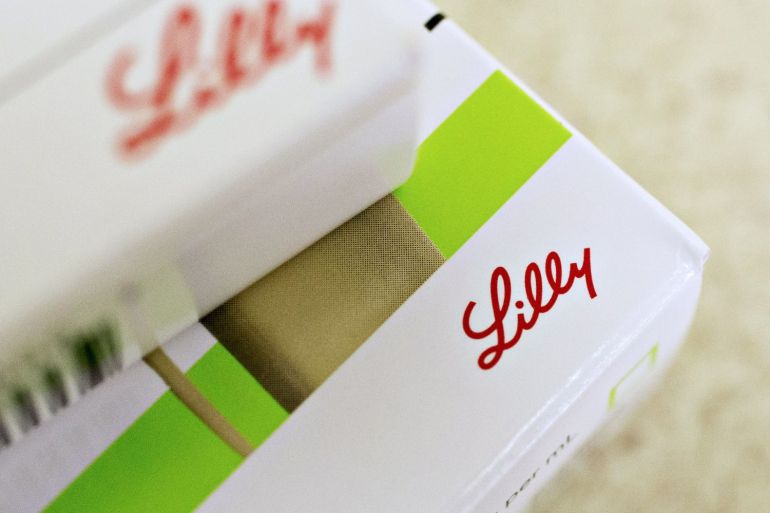US allows emergency use of Eli Lilly’s COVID-19 antibody drug
Treatment is meant for mild-to-moderate coronavirus cases but is not suitable for hospitalised patients, regulator says. Lilly shares rise on the news.

The United States’s drug regulator has authorised the emergency use of Eli Lilly’s experimental COVID-19 antibody treatment for non-hospitalised patients with mild-to-moderate symptoms.
The Food and Drug Administration (FDA) said its authorisation was based on clinical trials showing that the treatment, bamlanivimab, reduced the need for hospitalisation or emergency room visits in COVID-19 patients at high risk of the disease worsening.
Keep reading
list of 4 itemsAll you need to know about Pfizer’s COVID-19 vaccine in 600 words
Biden urges vigilance as Pfizer COVID-19 vaccine spurs hopes
COVID-19: Biden pleads ‘wear a mask’ ahead of ‘very dark winter’
It can now be used for treating mild-to-moderate COVID-19 in patients above the age of 12. Those above 65 or with certain chronic medical conditions can also be prescribed the drug, the FDA said.
But the antibody treatment is not authorised for patients who are hospitalised due to COVID-19 or require oxygen therapy due to COVID-19. The FDA said the drug, which US President Donald Trump has praised, had not been shown to benefit such patients and could worsen their clinical status.
A US government-sponsored study of the treatment in hospitalised COVID-19 patients was recently abandoned because the treatment was not shown to be helping.

Also on Monday, US medicine manufacturer Pfizer said its experimental COVID-19 vaccine is more than 90-percent effective, a major victory in the fight against the pandemic that has killed more than one million people, battered the world’s economy and upended daily life.
The news sent share markets surging on hopes that the vaccine would help speed up the recovery from the worst global economic downturn since the Great Depression.
In early October, Eli Lilly requested emergency use authorisation for its single-antibody therapy. Results from a study of 452 patients with mild-to-moderate COVID-19 published in a peer-reviewed journal in late October found that 1.6 percent of those who received the antibody infusion had to be hospitalised or required an emergency room visit, compared with 6.3 percent of those who received a placebo.
Double whammy
The company has said it plans to pursue a similar authorisation in November for its two-antibody cocktail, which it described as having helped reduce viral levels even more than the single-antibody treatment.
Both treatments are monoclonal antibodies – a widely used class of biotech drugs that are synthetic copies of antibodies created by the human body to fight infections.
Lilly expects to supply as many as one million doses of the single-antibody therapy in the fourth quarter, with 100,000 doses available in October. It struck a $1,250-per-dose deal with the US government and plans to sell the treatment to other countries.
Lilly said in a statement that bamlanivimab should be administered “as soon as possible after a positive Covid-19 test and within 10 days of symptom onset.”
Lilly will begin shipping the antibody therapy immediately to AmerisourceBergen Corp, which will distribute it as directed by the US government. People in the US will have no out-of-pocket costs for the medicine, the company said, while acknowledging that healthcare facilities may charge a fee for the product’s intravenous administration.
Shares of the Indianapolis drugmaker, which closed little changed at $142.33 in regular trading, were up 3.6 percent after hours.
Several other medicine producers, including Regeneron Pharmaceuticals Inc, are testing antibody treatments for COVID-19.
Regeneron’s antibody treatment was given to Trump after he caught the virus in early October. The nation’s top infectious disease expert Dr Anthony Fauci said it likely contributed to his recovery.